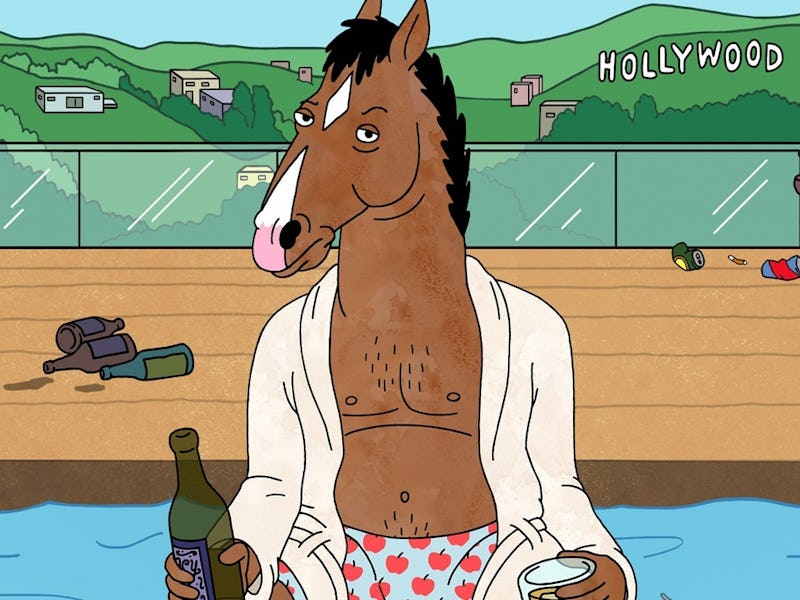Can Netflix Cement 'BoJack Horseman''s Genius In Season 3?
Middling reviews of the first 6 episodes failed the show early on.

When Netflix’s animated comedy BoJack Horseman debuted in full on August 22, 2014, it had a 53 percent rating on Rotten Tomatoes, and a 59 on Metacritic. Pretty average reviews for a show whose follow-up second season has a 100 percent and 90 on the same review aggregation websites. So, what the hell happened?
The show takes place in an alternate-reality where humans and anthropomorphic animals live side by side. The rules of how this works and how society functions are kind of unclear, but the show was open to hilarious animal puns and situational comedy as a result of its hybrid society. The star of the show is the eponymous character, an anthropomorphized horse. He used to star in a family sitcom back in the day, but has been reduced to a misanthropic has-been whose only goal is to reclaim the fame he once had in an attempt to feel happiness again.
The general sentiment upon BoJack Horsman’s initial debut was that it was a clever lark that seemed to be another pop-culture savvy animated series out of Fox or Adult Swim. Not to disparage the animated outputs of either of those networks, but Bojack Horseman was lumped together with a crowd it didn’t necessarily belong in.
As much as the show had fun juxtaposing Hollywood with the animal kingdom, the show’s first season ultimately became a meditation on depression, self-loathing, and the nature of happiness. Its penultimate episode in particular was an acid-trip down the main character’s broken psyche fueled by actual drugs and by his neurotic behavior. The episode ends with a devastating non-answer that essentially summarized the show’s main thesis.
That episode alone should have signified to critics what the show’s main intent was: not to make clever puns, but to illustrate that these characters, regardless of their form, were insecure of themselves to the point of self-destruction. And no critic mentioned any of this because they simply reviewed the first six episodes of a show released that was to be watched in full.
BoJack and Diane Nguyen
It was understood very quickly by watchers of the show that the public critical consensus of the show was incomplete and halved. Indiewire even changed its review policies to better accommodate shows that release full seasons all at once, in light of BoJack Horseman. As far as mea culpas go, that’s a pretty big one.
As the release of the third season looms – and critics telling readers that BoJack Horseman is the best show on Netflix – it’s no surprise that BoJack Horseman’s first season reviews were so lackluster despite the show’s natural evolution through Season 2. After all, only viewing six episodes of a 12-episode season will give you only half the picture. The question is, why was the follow through was so incomplete on BoJack Horseman?
Plenty of the reviews from outlets like IGN and the LA Times make it a point to say how derivative BoJack Horseman feels of other animated comedies. They boil down these similarities to the fact that the show relies heavily on self-awareness and absurdity, and while not naming specific titles, it’s pretty clear the critics were referring to shows like the ones put out by Seth McFarlane.
Now, Indiewire claims that BoJack Horseman’s third season “deserves an Oscar”. This begs the question of how in an animated landscape that’s had the pleasure of seeing amazing work since Matt Groening’s The Simpsons, has the McFarlane animated stables become the measure in which all new animated series targeting adults are compared to?
There’s really no doubt that some of the best animated comedies are considered as such because of their willingness to explore the full spectrum of emotions. The Simpsons (“Mother Simpson”), Futurama (“Jurassic Bark”), Bob’s Burgers (“Carpe Museum”), and Rick and Morty (“Auto Erotic Assimilation”) all have stand-out episodes that feature devastating, or heavily emotional payoffs. At the same time, new animated shows aren’t expected to compete with these shows from the offset.
Why not? Why can’t new animated comedies enter the television landscape with high aspirations of telling meaningful, sometimes devastating stories? Why is it that these shows often lure audiences in with crazy premises before pulling the rug beneath their feet and reveal an achingly bleeding heart?
On the one hand, animation use this sort of unexpected quality of their medium to their advantage. Presenting an animated world full of colorful and oddball characters only for the show to reveal its true depth is a tool that’s handled well by animators. Who would suspect that Cartoon Network’s Steven Universe would become such a pioneering show for LGBTQ representation? The Trojan Horse effect of cartoons is one that’s utilized mostly for the benefit of animated shows that want to say something more.
Jurassic Bark
At the same time, there is no doubt those initial reviews of BoJack Horseman turned off some would-be viewers, and now plenty of websites are playing catch-up, begging readers to give the show a chance, when the first things they probably heard about it were how average the whole thing was.
It’s a shame, but it shows to some extent that animated shows still have a long way to go before given a fair critical shot in the eyes of media critics. And while I’d personally hate to see the sort of subversive quality that comes with animated shows undermining initial impressions based on aesthetic design, it would help future BoJack Horseman shows pop-up in viewer’s radars with a fair shot.